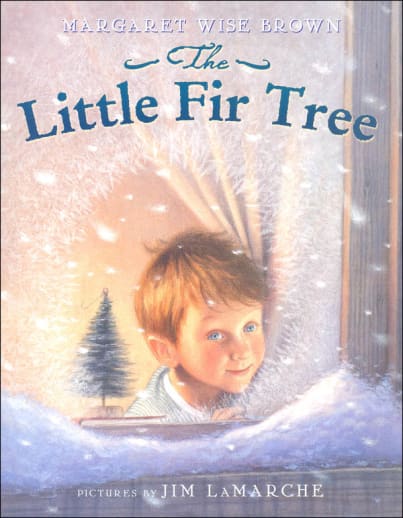For seven years the Little Fir Tree grows all alone, wishing to be part of something. Then one winter he is taken to visit a lame little boy for a special celebration that he repeats for years to come. But one final year the celebration comes to him! A Margaret Wise Brown book with more length and intensity than others you might be familiar with. A lovely story of yearning and hope for Christmas"and any time. 8.5" x 11",32 pp, sc ~ Ruth
Little Fir Tree
SKU
022715
ISBN
9780064435291
Grade PK-3
These icons are designed to help you quickly understand and learn important information about our products.
Teaching Method
Traditional
Teacher-centered curriculum commonly used in classrooms that may include a text, teacher manual, tests, etc.
Charlotte Mason
A methodology based on the work of a 19th century educator who maintained that children learn best from literature (Living Books), not textbooks.
Classical
A methodology based on the Latin Trivium (three stages of learning), including the grammar stage (memorization and facts), logic stage (critical thinking), and rhetoric stage (developing/defending ideas).
Unit Study
A thematic or topical approach centered around one topic that integrates multiple subject areas.
Montessori (Discovery)
A methodology based on the work of a 20th century educator that emphasizes student and sensory-driven discovery learning and real-life applications.
Other
Other methodologies
Religious Content
Secular
Contains content contrary to common Christian beliefs (i.e. evolution).
Neutral
Avoids religious or theoretical topics or presents multiple viewpoints without preference.
Christian/Religious
Faith-based or including instructional religious content.
Learning Modality
Auditory
Learns through listening, talking out loud or reading out loud.
Visual
Learns through seeing, prefers written instructions and visual materials.
Kinesthetic/Tactile (Hands-On)
Learns through moving, doing and touching.
Multi-Sensory
Curriculum that employ a variety of activities/components.
Presentation
Sequential
Curriculum progresses through well-defined learning objectives. Emphasizes mastery before moving to the next topic.
Spiral
Topics and concepts are repeated from level to level, adding more depth at each pass and connecting with review.
Conceptual/Topical
Focus is on the “why,” often with a unifying concept as well as specific skills; coverage may be broader.
Teacher Involvement
Low Teacher Involvement
Student-led materials; parent acts as a facilitator.
Medium Teacher Involvement
A mix of teacher-led time and independent student work.
High Teacher Involvement
Teacher-led lessons; may utilize discussions, hands-on activities and working together.
Additional Materials Required
No other materials needed
Everything you need is included.
Other Materials Required
There are additional required resources that are a separate purchase.
Other Materials Optional
There are additional resources mentioned or recommended but are not absolutely necessary.
Consumable
Consumable
Designed to be written in; not reusable.
Non-Consumable
Not designed to be written in; reusable.
Our Price
$9.99 $9.99 $7.95
Rainbow Savings: $2.04
Description
Publisher's Description of Little Fir Tree
Once there was a tree that stood in a field away from the other trees. It longed to be part of the forestor part of anything at all. After many lonely years, its dream came true. And the little fir tree's life changed forever!
They put golden tinsel on his branches
And golden bells
And green icicles
And silver stars.
And soono shining wonderthe little fir tree was . . .
A Christmas tree
Celebrate the true spirit of Christmas with heartwarming text by the author of Goodnight Moon and exquisite, glowing paintings by award-winning artist Jim LaMarche.
Category Description for Christmas Stories
Take
some time out of the hustle and bustle to read treasured Christmas stories with
your children. Or start a new tradition of a “read-aloud” advent calendar with
your children and read a different Christmas book each day. Download our Holiday Reading
advent calendar for some ideas!
Details
| Product Format: | Paperback |
|---|---|
| Grades: | PK-3 |
| Brand: | HarperCollins Childrens |
| Author: | Margaret Wise Brown |
| ISBN: | 9780064435291 |
| Length in Inches: | 10.9375 |
| Width in Inches: | 8.5 |
| Height in Inches: | 0.125 |
| Weight in Pounds: | 0.35 |
Videos
Reviews

